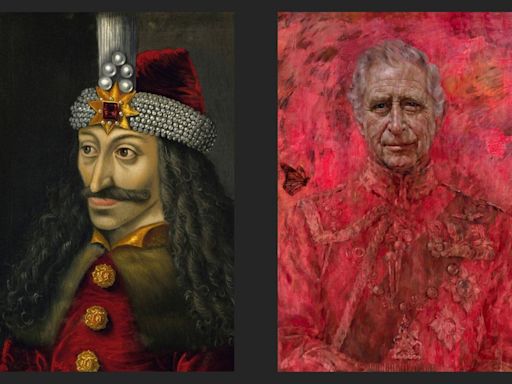Search results
Apr 30, 2024 · Vlad the Impaler (born 1431, Sighișoara, Transylvania [now in Romania]—died 1476, north of present-day Bucharest, Romania) was a voivode (military governor, or prince) of Walachia (1448; 1456–1462; 1476) whose cruel methods of punishing his enemies gained notoriety in 15th-century Europe. Some in the scholarly community have suggested that ...
- Famous Vampires Quiz
Famous Vampires Quiz Question: In the television show Buffy...
- Walachia
Walachia, principality on the lower Danube River, which in...
- Famous Vampires Quiz
Signature. Vlad III, commonly known as Vlad the Impaler ( Romanian: Vlad Țepeș [ ˈ v l a d ˈ ts e p e ʃ]) or Vlad Dracula ( / ˈdrækjʊlə, - jə -/; Romanian: Vlad Drăculea [ ˈ d r ə k u l e̯a]; 1428/31 – 1476/77), was Voivode of Wallachia three times between 1448 and his death in 1476/77. He is often considered one of the most ...
- Eupraxia of Moldavia (?)
- Vlad II of Wallachia
- Vladislav II
Mar 13, 2023 · Vlad the Impaler, the brutal ruler of Wallachia and inspiration for Dracula, was beheaded by the Ottomans in 1476. Learn about his life, crimes, and legacy in this article.
- How Did Vlad The Impaler Die?
- What Happened to Vlad The Impaler?
- Where Is Vlad The Impaler Buried?
- Dracula’s Life and The Events That Led to His Death
- GeneratedCaptionsTabForHeroSec
Vlad the Impaler died either in late December 1476 or early January 1477. He was fighting a battle against the Turkish Ottoman Empire and Basarab Laiotă, who had laid claim to Wallachia. Vlad the Impaler, also known as Vlad III, ruled Wallachia, today’s Romania, in the 15th century. Vlad had the support of Stephen the Great, the voivode (or governo...
How did Vlad the Impaler die? There are several theories about how exactly it could have happened. There were no eyewitnesses and no written accounts left behind of the event. Chroniclers and writers who wrote at the timecould only speculate based on interviews with family and allies. What we do know is that Vlad the Impaler died in the midst of a ...
The site of Vlad the Impaler’s burial is not known. Records from the 19th century show that the general populace believed he was buried in the Monastery of Snagov. Excavations were carried out in 1933 by archaeologist Dinu V. Rossetti. No tomb was discovered beneath the unmarked tombstone that supposedly belonged to Vlad. Rossetti stated that there...
Vlad III was the second son of Vlad II Dracul and an unknown mother. Vlad II became the ruler of Wallachia in 1436 and was given the name ‘Dracul’ because he belonged to the Order of the Dragon. The Order was created to halt the Ottoman advance into Europe. Vlad III was probably born between 1428 and 1431. Vlad began to call himself Vlad III Dracul...
Learn about the different accounts and legends surrounding the death of Vlad the Impaler, the 15th-century ruler of Wallachia and inspiration for Dracula. Find out who his enemies were, how he fought against the Ottomans, and where his body was buried.
Vlad III, Prince of Wallachia called "Vlad the Impaler" and also known as Vlad Dracula or simply Dracula, in Romanian Drăculea (1431 – December 1476), was a Wallachian (southern Romania) voivode (military commander). His three reigns were in 1448, 1456–1462, and 1476. Vlad the Impaler is known for the exceedingly cruel punishments he ...
People also ask
How did Vlad die?
Was Vlad III the inspiration for Dracula?
Is Vlad still alive in Transylvania?
Who was Vlad Dracula?
Vlad's patronymic inspired the name of Bram Stoker 's literary vampire, Count Dracula. Vlad III, commonly known as Vlad the Impaler or Vlad Dracula, was Voivode of Wallachia three times between 1448 and his death in 1476/77. He is often considered one of the most important rulers in Wallachian history and a national hero of Romania.
May 15, 2019 · Learn about the life and legacy of Vlad III, the 15th-century ruler of Wallachia who inspired the novel "Dracula". Find out how he fought against the Ottomans, the Hungarians, and the boyars, and when and how he died.

